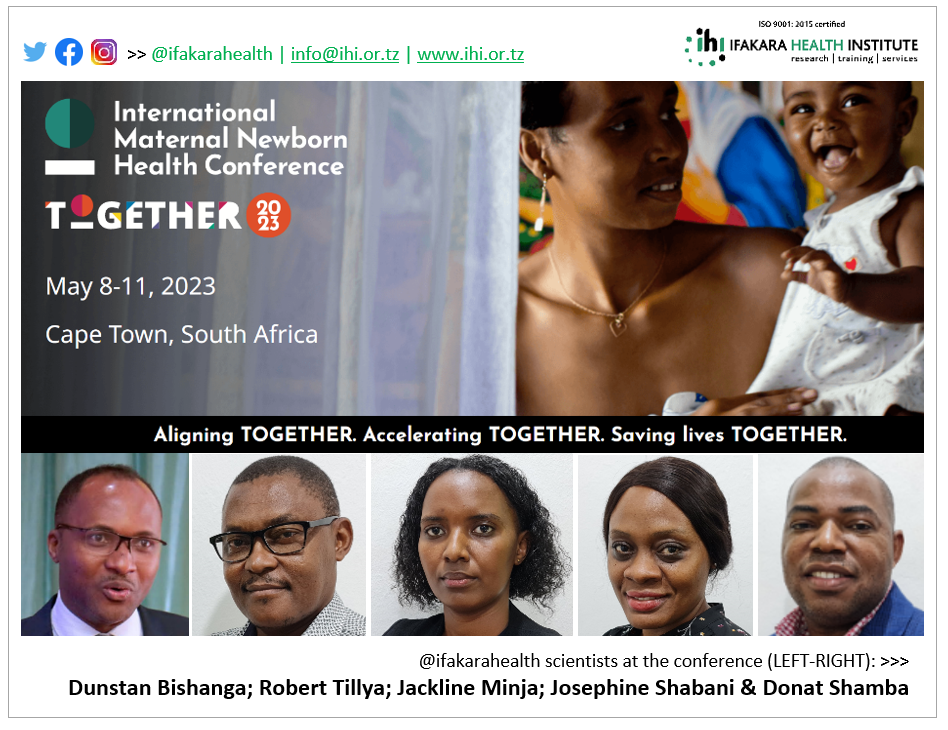
#IMNHC2023: Ifakara scientists join conversation at global maternal & newborn health conference

For the first time in eight years, more than 1,500 stakeholders from around the world assemble in Cape Town, South Africa for the International Maternal Newborn Health Conference (IMNHC) scheduled for May 8-11, 2023.
Five Ifakara Health Institute research scientists attend the event. They are: Donat Shamba, Josephine Shabani, Jackline Minja, Robert Tillya and Dunstan Bishanga. The theme for the conference is “TOGETHER, we’re a community on the move” and will bring together the maternal newborn health community to drive urgent action for the health of mothers and newborns.
The IMNHC2030 website shared the attendees “will collaborate and foster strong connections, exchanging the most effective tools, sharing best practices and evidence, and investing in proven interventions” during the conference.
Ifakara Health Institute implement the Newborn Essential Solutions and Technologies (NEST360) program – a global consortium committed to reducing newborn deaths by 50% in hospitals. Ifakara will showcase NEST360 activities during the Tanzania exhibition session at the IMNHC NEST360 Expo.
On May 10, Jacqueline Minja and Donat Shamba will present at the Technical Marketplace alongside presenters from the International Centre for Diarrhoeal Disease Research, Bangladesh (ICDDR, B), The London School of Hygiene and Tropical Medicine (LSHTM), and Data for Impact (D4I).
Jacqueline, Donat and Robert will give a hands-on demonstration on Every Newborn Measurement Improvement for Newborn & Stillbirth Indicators (EN-MINI) tools designed to advance newborn data in Routine Health Information Systems (RHIS) to support Every Newborn Action Plan (ENAP). The tools are free, easy to use, and generate automated reports for sub-national and national use.
Learn more about the EN-MINI tools: https://www.data4impactproject.org/resources/en-mini-tools/
At the IMNHC NEST360 Expo during the Tanzania exhibition session on May 10, Dr. Robert Tillya and Josephine Shaban will showcase an innovative approach to small and sick newborn care through an interactive booth in the Exhibition Hall.
They will interact with conference attendees visiting the booth and facilitate demonstrations across three areas – the Clinical, Devices and Maintenance, and Data for Action stations – to highlight what the NEST306 program does and the challenges they solve for small and sick newborns.
On May 11, Jacqueline will be among the three presenters during a panel discussion titled, “Emerging opportunities for improving the availability and quality of maternal and newborn health data.” Her presentation will focus on EN-MINI tools whereby she will also display to the audience a video infographic on EN-MINI tools.
Link to the EN-MINI tools video infographic: https://vimeo.com/721086416
According to the IMNHC organization website, this year’s conference is organized by the AlignMNH Secretariat and the maternal newborn health community. IMNHC 2023 is designed to create an opportunity to bring forward new evidence, create an opportunity for conversation, and bring together maternal newborn health efforts.
The website reports that IMNHC 2023 is the first biannual conference, and in the future, an IMNHC will be held every two years to maintain our global progress towards improving maternal newborn health.
More about the EN-MINI tools
From 2016–2020, the EN-BIRTH team completed a validation study in Bangladesh, Nepal, and Tanzania assessing measurement coverage and quality of maternal and newborn care.
EN-BIRTH found newborn data quality in routine systems varied, which led to a follow-on up study—EN-BIRTH Phase 2—to explore opportunities to improve data for use. The EN-MINI tools were designed and made available through collaborative implementation research by The London School of Hygiene & Tropical Medicine UK, Ifakara Health Institute Tanzania, icddr,b Bangladesh, and D4I.
An EN-BIRTH expert advisory group of colleagues from WHO, UNICEF, the national governments of Bangladesh and Tanzania, and additional program newborn and measurement experts and academics provided important guidance.
Through the use of EN-MINI tools, the team hopes to meet global targets to end preventable newborn deaths and stillbirths each year by 2030.
Learn more about EN-MINI tools: https://www.data4impactproject.org/resources/en-mini-tools/
